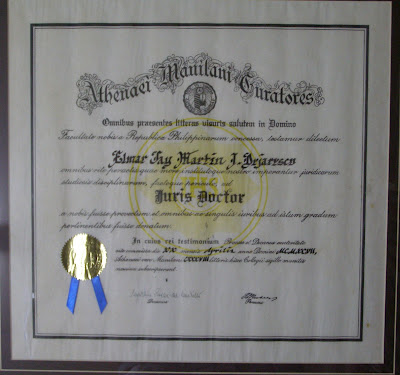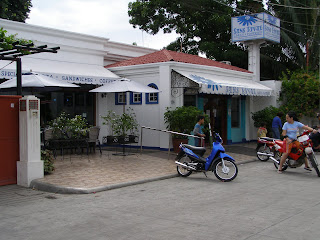We should congratulate Representative George Arnaiz for coming forward to explain how he used the five million pesos which the province received for fertilizers to help our poor farmers with their farming efforts.
This five million pesos is part (kuno) of the P728-million “fertilizer fund scam” which is now being investigated by the Senate.
The allegation is that the P728-million was mis-used and eventually diverted to bankroll the candidacy of President Arroyo 2004.
On the hot seat is the former Agriculture Department undersecretary Jocelyn “joke-joke” Bolante, who has been alleged to be the architect of the fund mis-use and diversion.
Bolante has flatly denied the accusations under oath, on nationwide television before a Senate inquiry.
Rep. George Arnaiz (who was governor during the distribution of the controversial funds) has confirmed that five million pesos was actually received for Negros Oriental farmers.
The explanation Rep. Arnaiz explained, and as published in this paper, that everything was in order and that five million pesos was used for the benefit of the farmers, and that no money went to private pockets.
I fully believe our good Rep. George Arnaiz.
Change of public purpose?However, there are some points in his explanation that left me unsatisfied.
First question: Joke-joke Bolante testified under oath before the House investigation that "not a single centavo" of the fund went to any congressman, governor, or mayor. So what is this five million pesos admittedly received by the provincial government?
Second question: Why was part of the five million pesos received by the province (P1.75-million), used to buy “farm equipments” instead of fertilizers?
It was reported that when an additional P1.75 million was released by DBM representing the second tranche of the fertilizer fund, the provincial government decided to use it to buy farm equipments instead.
The farm equipments (which obviously are not fertilizers) include thresher/shellers, hand tractor, flat bed dryers.
Third question: Who has the discretion to switch the use of public funds from one public purpose (fertilizers), to another public purpose (farm equipments).
Boncodin testimonyMay I refer to the 2006 Senate Committee report under former Senator Jun Magsaysay.
Former Budget Secretary Emilia Boncodin testified before the committee that: The release of funds made by the DBM was for farm inputs which could incorporate fertilizers, seeds and even insecticides.
“
But the actual purpose for which the same will be used will depend on the Department of Agriculture” Boncodin said.
It is thus clear that it is the D.A. that decides the “actual purpose” for which the funds are to be used, not the local government.
Fourth question: What is the legal basis of the local government unit in changing the public purpose of public funds from “fertilizers” to “farm equipments”?
I am asking these question on the angle of technical malversation.
Technical malversation may arise if public funds are applied to a public use (farm equipments) other than that for which the fund has been appropriated (fertilizers).
The constitutional violationMay I kindly remind that we have a specific constitutional mandate in Section 25(2) Article VI that provides:
"No provision or enactment shall be embraced in the general appropriations bill unless it relates specifically to some particular appropriation therein. Any such provision or enactment shall be limited in its operation to the appropriation to which it relates."It seems to me that the constitutional command that appropriations must be particularized and specific has been blatantly violated.
We hear testimony that money was given to local government officials. Some admit fertilizers were given (not cash). Other say the money was used to buy local fertilizers, and local farm equipment. Sir George says he received money and he conducted bidding on fertilizers and farm equipments. Ano ba talaga?
What does the national budget (the appropriations law) say?
Who has discretion? Bolante? The D.A.? The congressman? The governor?
Was the appropriations law followed in the P728-fertilizer fund?
Biggest Source of corruptionDo you know what is the biggest source of corruption in government?
Its called "
Lump sum appropriations".
My theory is that lump sum appropriations are unconstitutional.
Lump sum appropriations are not particularized appropriations.
That is why funds are juggled, because they are appropriated in lump sum.
With lump sum approrpiations, the executive department(starting with the President)and the legislators, are just too happy because they have spacious room and wide latitude to juggle and maneuver our taxes to their liking (i.e. bankroll elections).
As one lawmaker asked: "What are we in power for?"
This is another good article to write about.
Better probing With all due respect to our probing legislators, if they want to pin down Bolante, they should focus their questions on the constitutional provisions on appropriations.
They should determine whether the constitution (provisions on appropriations) was violated.
Then they should tie this issue with the criminal laws on malversation, technical malversation, and graft (RA 3019).
I used to work in the Senate Blue Ribbon committee. Questions are supposed to be thoughtfully prepared.
But it seems Bolante is more prepared--and very intelligent.
One unwritten rule has been violated in these legislative questionings: Do not ask open-ended questions when you have an intelligent witness.
If you do, the witness will drive you around town on a joyride.
And that is what Bolante has done successfully.
Why was there a local bidding?What also disturbs me is the “bidding” conducted by the provincial government. This needs to be clarified.
Rep. Arnaiz’s explanation is that there was a (local) public bidding for the purchase of the fertilizers.
He publicized the winning bidders/suppliers of fertilizers.
However, I thought the P728-million fertilizer program was already a centralized
negotiated contract between the Department of Agriculture and the controversial fertilizer supplier (Feshan).
It was the late journalist Marelene Esperat who exposed this “negotiated contract,” which many believed was the reason for her assassination.
So why did the provincial government conduct a local bidding for fertilizers, when there was already a negotiated contract between DA and the supplier Feshan?
If you were the entity/supplier with a contract with the Department of Agriculture already, and the local government unit still conducts a bidding to award to somebody else, how would you react? Will you be happy? Won't you sue?
It doesn't make sense, does it?
D.A. the procuring entity, not the LGUBesides, the P728-million fertilizer fund is an appropriation to the Department of Agriculture (AFMA) and not to the provincial government.
So it should be the D.A. that should conduct the bidding or negotiated contract.
Under the procurement law (R.A. 9184) it is the D.A. that is the procuring entity (not the provincial government).
Under the general appropriations law, the fertilizer fund is an appropriation to the D.A., through the Agriculture and Fisheries Modernization Act (AFMA), not to the provincial government.
Doubts There are quite interesting points in the good congressman’s explanations which I have compared with the Senate committee report.
Unfortunately, in my reading, many things do not match (Dili mo takdo).
I am thus prompted to ask: Is the five million pesos referred to by the good congressman in his explanation, really a part of the controversial P728-million fertilizer fund?
I doubt it.

































